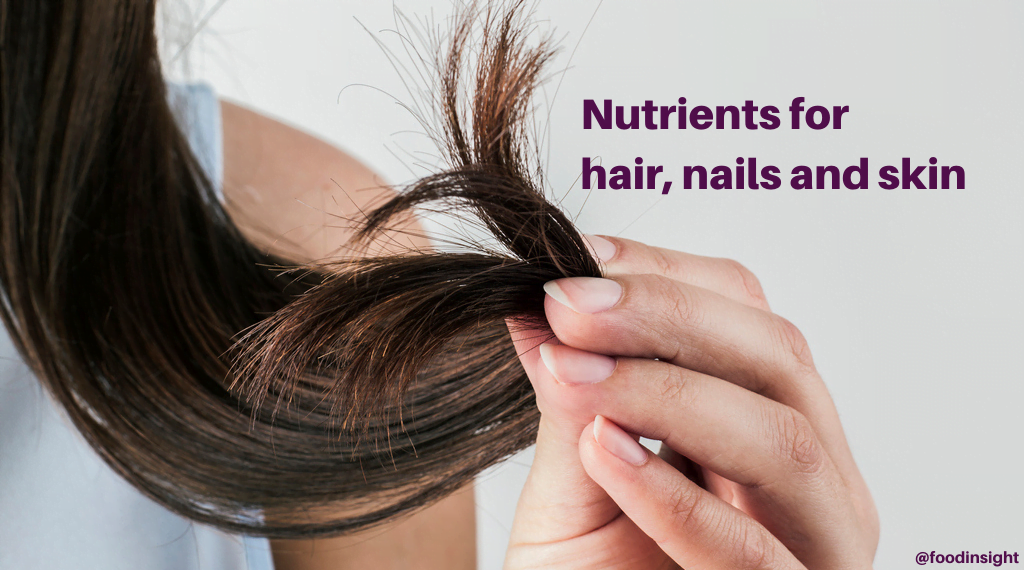Ever wondered how certain nutrients can impact the health of our hair, nails and skin? Many of us have seen beauty claims on supplements or skincare products that a specific nutrient or ingredient will remove wrinkles, make hair shine or strengthen nails. While those claims might be an exaggeration, there are some real, science-based connections between certain vitamins and minerals and the health of our hair, nails and skin. Let’s explore four key nutrients that play a pivotal role in these areas.
Vitamin A
This fat-soluble vitamin is essential for our vision, immune system and skin health. If you’ve ever seen a skincare claim about retinol, it is referring to a type of vitamin A. Retinol is known for its acne and wrinkle-reducing abilities; research suggests that topical retinol can improve fine wrinkles in naturally aging skin and decrease acne symptoms. Vitamin A deficiency may result in scaly, dry skin and loss of hair. However, a vitamin A supplement is usually only recommended when there is a true vitamin A deficiency, which is uncommon in the U.S. People with cystic fibrosis or malabsorption disorders are most likely to be at risk for a vitamin A inadequacy.
Because vitamin A is stored in our bodies, excessive quantities can be toxic, so be careful to not overdo vitamin A intake. The recommended daily allowance (RDA) is 900 micrograms daily for men and 700 micrograms daily for women. About one cup of raw carrots provides 900 mcg. To maximize your vitamin A potential, eat a well-rounded diet and include plenty of fruits and vegetables, along with dairy products, fish, liver, and fortified cereals.
Vitamin C
Vitamin C acts as an antioxidant in our bodies and plays an important role in our skin health. Skin contains vitamin C, which supports collagen synthesis and helps protect against damage from UV-rays. As such, you may have seen vitamin C-infused serums or moisturizers in the beauty world. Ongoing research suggests topical vitamin C can reduce hyperpigmentation and tissue inflammation; however, it’s best to talk with a dermatologist to determine if this type of vitamin C is appropriate for you.
A deficiency in vitamin C leads to scurvy, which is uncommon in the U.S. but can still occur in people with limited variety in their diet or people who smoke heavily. The RDA is 90 milligrams (mg) daily for men and 75 mg daily for women. A glass of orange juice provides 80 mg per serving. Vitamin C is found in many fruits and vegetables; the highest sources include bell peppers, citrus fruits and their juices.
Biotin
Biotin is probably the most well-known over-the-counter (OTC) supplement for beauty needs. Biotin is part of the B complex that helps our bodies convert food into energy and metabolize fats and proteins. If you don’t get enough biotin, you may see thinning of hair, scaly skin, and brittle nails.
According to the American Academy of Dermatology, getting adequate amounts of biotin through food or supplements may improve nail care and help to grow and thicken hair. A systematic review of biotin’s effects on hair and nail growth provides evidence for “clinical improvement in patients who had an underlying pathology for poor hair or nail growth.” However, there is a lack of sufficient evidence for biotin supplementation in healthy individuals. People who have a biotinidase deficiency, people who abuse alcohol or are pregnant or lactating women are most likely to be at risk for a biotin inadequacy and may benefit from a biotin supplement. An adequate intake for biotin of 30 micrograms (mcg) per day for all adults has been set by the National Academy of Sciences. As you consider the need for a supplement, reach for biotin-rich foods including nuts, vegetables, salmon and eggs.
Zinc
Zinc is an essential mineral necessary for cellular metabolism, immune function and wound healing. Research shows zinc is effective in healing skin lesions, like in the treatment of acne, psoriasis, and dermatitis. Additionally, zinc accelerates the healing process of wounds and burns due to its role in the synthesis of collagen, which is an important protein found in skin. Although zinc won’t increase your hair growth, including zinc in your diet can help prevent hair loss.
A deficiency in zinc is associated with growth retardation, loss of appetite, skin irritation and impaired immune function. Some research supports the use of a zinc supplement to reduce the duration of the common cold, though a dosage amount has not been formally recommended. People with gastrointestinal conditions, vegetarians, vegans, pregnant and lactating women, people who abuse alcohol and people with sickle cell disease are most likely to be at risk for zinc inadequacy and may benefit from a zinc supplement. The recommended daily allowance (RDA) is 11 mg daily for men and 8 mg daily for women. Zinc is found in high-protein foods such as meat and seafood.
The Bottom Line
While these important nutrients do contribute to our hair, skin and nail health, it’s not necessary to start a whole new supplement routine. In most cases, a supplement is only needed if there is a vitamin or mineral deficiency. A well-rounded diet is your best bet for consuming adequate amounts of vitamin A, vitamin C, biotin and zinc and reaping hair, nails and skin benefits. If you have concerns about your nutrient intake, always consult with your healthcare provider.
This article includes contributions by Anastasia Maczko, RD.
